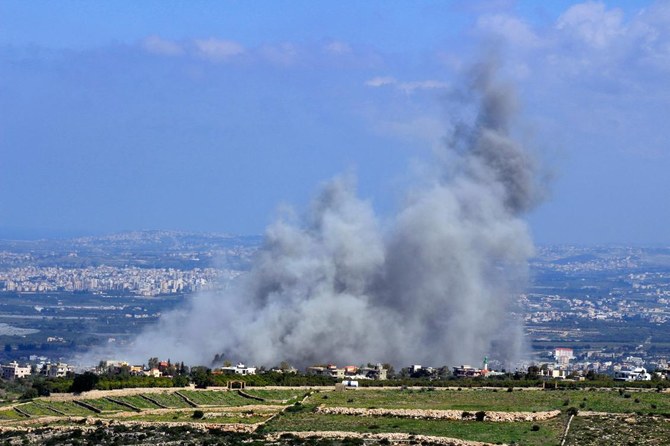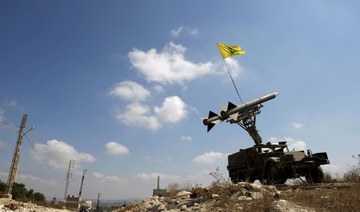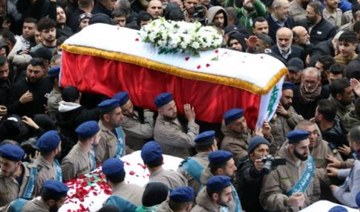BEIRUT: The Israeli military and Hezbollah have a window to de-escalate tensions along Lebanon’s southern border before a possible Israeli military offensive against the Lebanese armed group, two Democratic US senators told Reuters on Wednesday.
Senators Chris Coons and Richard Blumenthal met Lebanese officials on a tour of the region, which has been gripped by conflict following Hamas’s Oct. 7 attack on Israel, which responded with a heavy air, land, and sea assault on Gaza.
In Lebanon, Israeli shelling has killed nearly 190 Hezbollah fighters and 50 civilians. A dozen Israeli troops and five Israeli civilians have been killed in northern Israel, and tens of thousands have been displaced on each side.
“The next few weeks are a real hinge point — for Gaza, for Israel, for Lebanon, for the Red Sea, for Iraq,” said Coons, adding that a ceasefire for Gaza could have “positive consequences” for Lebanon.
“It could create that window of 45 days, quite likely during Ramadan as well, when the next steps can be taken to begin to build the confidence that could lead to a full implementation of (United Nations Security Council resolution) 1701,” he said.
That 2006 resolution ended the last major conflict between Hezbollah and Israel and says no armed factions should be present in a swathe of south Lebanon except the Lebanese army.
France submitted a written proposal to Lebanon earlier this month on a possible diplomatic resolution. US envoy Amos Hochstein has also been working on a plan, which Coons said he hoped was “making steady progress” without sharing further details. He said there was an “urgency” for both sides to de-escalate.
The senators said they told Lebanese Speaker of Parliament Nabih Berri, who heads the Hezbollah-allied Amal Movement, that Israel “is not bluffing” about an offensive.
“It’s not just rhetoric. It will act. And we hope that that message was conveyed to Hezbollah,” Blumenthal said.
US senators say it is ‘urgent’ for Hezbollah-Israel war to de-escalate soon
https://arab.news/b5a67
US senators say it is ‘urgent’ for Hezbollah-Israel war to de-escalate soon

- Senators Chris Coons and Richard Blumenthal met Lebanese officials on a tour of the region
- “The next few weeks are a real hinge point — for Gaza, for Israel, for Lebanon, for the Red Sea, for Iraq,” said Coons
UAE, Iran discuss bilateral relations

DUBAI: The United Arab Emirats Minister of Foreign Affairs, Sheikh Abdullah bin Zayed, had a phone conversation on Saturday with Iran's acting Minister of Foreign Affairs, Ali Bagheri Kani, to discuss the bilateral relations between the two countries.
During the call, they exchanged Eid Al-Adha greetings and explored ways to enhance cooperation that would serve the mutual interests of their countries and peoples, contributing to regional security and stability.
They also reviewed several issues of common interest, as well as recent developments in both regional and international arenas.
Two explosions near vessel off Yemen’s coast, UK maritime office says

- Houthi militants, who are backed by Iran, have been targeting vessels off the Yemen’s coast
CAIRO: The United Kingdom Maritime Trade Operations (UKMTO) said on Sunday a vessel 40 nautical miles south of Al-Mukha in Yemen had reported two explosions nearby, adding that the vessel and its crew were safe and proceeding to their next port of call.
Authorities are investigating, UKMTO said.
UKMTO WARNING INCIDENT 087 ATTACK UPDATE 001https://t.co/fX3hWupi7g#MaritimeSecurity #MarSec pic.twitter.com/tOQXLZoQ9w
— United Kingdom Maritime Trade Operations (UKMTO) (@UK_MTO) June 16, 2024
Houthi militants, who are backed by Iran, have been targeting vessels off the Yemen’s coast in what they said is a show of solidarity with the Palestinians being killed in Israel’s war on Gaza.
Iran rebukes G7 statement over its nuclear program escalation

- Tehran’s foreign ministry calls on G7 to distance itself from ‘destructive policies of the past’
- Iran is now enriching uranium to up to 60 percent purity close to the 90 percent weapons grade
DUBAI: Iran called upon the Group of Seven on Sunday to distance itself from “destructive policies of the past,” the Iranian Foreign Ministry spokesperson Nasser Kanaani said, referring to a G7 statement condemning Iran’s recent nuclear program escalation.
On Friday, the G7 warned Iran against advancing its nuclear enrichment program and said they would be ready to enforce new measures if Tehran were to transfer ballistic missiles to Russia.
“Any attempt to link the war in Ukraine to the bilateral cooperation between Iran and Russia is an act with only biased political goals,” Kanaani said, adding that some countries are “resorting to false claims to continue sanctions” against Iran.
Last week, the UN nuclear watchdog’s 35-nation Board of Governors passed a resolution calling on Iran to step up cooperation with the watchdog and reverse its recent barring of inspectors.
Iran responded by rapidly installing extra uranium-enriching centrifuges at its Fordow site and begun setting up others, according to a International Atomic Energy Agency (IAEA) report.
Kanaani added Tehran would continue its “constructive interaction and technical cooperation” with the IAEA, but called its resolution “politically biased.”
Iran is now enriching uranium to up to 60 percent purity, close to the 90 percent of weapons grade, and has enough material enriched to that level, if enriched further, for three nuclear weapons, according to an IAEA yardstick.
Israeli military announces ‘tactical pause’ in attempt to increase flow of aid into hard-hit Gaza

- The pause is aimed at allowing aid trucks to reach the Israel-controlled Kerem Shalom crossing
JERUSALEM: The Israeli military on Sunday announced a “tactical pause” in its offensive in the southern Gaza Strip to allow the deliveries of increased quantities of humanitarian aid.
The army said the pause would begin in the Rafah area at 8 a.m. (0500 GMT, 1 a.m. eastern) and remain in effect until 7 p.m. (1600 GMT, noon eastern). It said the pauses would take place every day until further notice.
The pause is aimed at allowing aid trucks to reach the nearby Israel-controlled Kerem Shalom crossing, the main entry point for incoming aid, and travel safely to the Salah a-Din highway, a main north-south road, to deliver supplies to other parts of Gaza, the military said. It said the pause was being coordinated with the UN and international aid agencies.
The crossing has suffered from a bottleneck since Israeli ground troops moved into Rafah in early May.
Israel’s eight-month military offensive against the Hamas militant group has plunged Gaza into a humanitarian crisis, with the UN reporting widespread hunger and hundreds of thousands of people on the brink of famine. The international community has urged Israel to do more to ease the crunch.
From May 6 until June 6, the UN received an average of 68 trucks of aid a day, according to figures from the UN humanitarian office, known as OCHA. That was down from 168 a day in April and far below the 500 trucks a day that aid groups say are needed.
The flow of aid in southern Gaza declined just as the humanitarian need grew. More than 1 million Palestinians, many of whom had already been displaced, fled Rafah after the invasion, crowding into other parts of southern and central Gaza. Most now languish in ramshackle tent camps, using trenches as latrines, with open sewage in the streets.
COGAT, the Israeli military body that oversees aid distribution in Gaza, says there are no restrictions on the entry of trucks. It says more than 8,600 trucks of all kinds, both aid and commercial, entered Gaza from all crossings from May 2 to June 13, an average of 201 a day. But much of that aid has piled up at the crossings and not reached its final destination.
A spokesman for COGAT, Shimon Freedman, said it was the UN’s fault that its cargos stacked up on the Gaza side of Kerem Shalom. He said the agencies have “fundamental logistical problems that they have not fixed,” especially a lack of trucks.
The UN denies such allegations. It says the fighting between Israel and Hamas often makes it too dangerous for UN trucks inside Gaza to travel to Kerem Shalom, which is right next to Israel’s border.
It also says the pace of deliveries has been slowed because the Israeli military must authorize drivers to travel to the site, a system Israel says was designed for the drivers’ safety. Due to a lack of security, aid trucks in some cases have also been looted by crowds as they moved along Gaza’s roads.
The new arrangement aims to reduce the need for coordinating deliveries by providing an 11-hour uninterrupted window each day for trucks to move in and out of the crossing.
It was not immediately clear whether the army would provide security to protect the aid trucks as they move along the highway.
Israel’s ‘economic war’ chokes occupied West Bank

- Banking in the Palestinian territories is challenging, with the Palestinian Authority under scrutiny for potential terror financing
- Palestinian businesses receive nearly $1.7 billion annually for exports, according to the Palestine Monetary Authority
RAMALLAH, Palestinian Territories: Palestinian teenagers bounced on trampolines and jumped through hoops inside a towering tent on the outskirts of Ramallah, the financial hub of the occupied West Bank.
But the circus students weren’t the only ones bending over backwards in the pavilion: the school’s director faced financial hurdles to buy the tent from Europe and trampolines from Asia.
“We are suffering with international payments,” said Mohamad Rabah, head of the Palestinian Circus School, describing a bureaucratic process that could delay equipment delivery by up to a month.
Banking in the Palestinian territories is challenging, with the Palestinian Authority (PA) under scrutiny for potential terror financing, hindering transactions.
Israel has occupied the West Bank since 1967, with strong economic ties allowing two Israeli lenders to serve as correspondent banks in the Palestinian territory.
But this may change if Israel’s far-right Finance Minister Bezalel Smotrich carries out threats to sever a vital banking route next month.
Since Hamas’s October 7 attack triggered the Gaza war, Israel has imposed economic curbs on the PA, withholding tax revenues it collects on its behalf.
Smotrich said this week he had redirected $35 million in PA tax revenues to families of “terrorism” victims, a move condemned by the United States.
After three European countries recognized Palestinian statehood in May, Smotrich told Prime Minister Benjamin Netanyahu he would not extend indemnity to banks that transfer the funds from the end of June.
Israel’s Bank Hapoalim and Israel Discount Bank need protection, expiring on July 1, to avoid sanctions for dealing with Palestinian lenders.
Israel’s central bank and finance ministry declined to comment when contacted by AFP.
The banking channel used to pay for West Bank imports — including essential goods like water, fuel and food — handles $8 billion yearly.
Palestinian businesses receive nearly $1.7 billion annually for exports, according to the Palestine Monetary Authority.
“For us, because our economy is dependent on the Israeli economy, because Israel is controlling the border, the impact will be high,” said PMA governor Feras Milhem.
The Palestinian economy is largely governed by the 1994 Paris Protocol, which granted sole control over the territories’ borders to Israel, including the right to collect import duties and value-added tax for the PA.
Palestinian livelihoods have also been hurt by bans on laborers crossing into Israel and by a sharp downturn in tourism in the territory, including a quiet Christmas season in Bethlehem.
The United States has urged Israel to improve conditions, warning that severing the banking route would have a dire impact on the West Bank economy.
“I believe it would create a humanitarian crisis in due course if Palestinian banks are cut off from Israeli correspondence,” US Treasury Secretary Janet Yellen said last month.
Western governments fear Israel’s economic policies could destabilize the West Bank.
“The banking system may collapse and therefore the PA may collapse as well,” a European diplomatic source in Jerusalem said on condition of anonymity.
“The PA is in a financial crisis and it could collapse before August.”
Palestinian businessmen say their bottom lines have been hit since October 7.
Imad Rabah, who owns a plastics company, said his net income had fallen 50 percent in one year.
Arak producer Nakhleh Jubran said his liquor business had fallen 30 percent over the same period.
“We have a traditional war in Gaza and we have an economic war in the West Bank,” said Jubran.
Musa Shamieh, who owns a womenswear company said the Israeli policies were designed to push Palestinians to leave the West Bank.
“They want us to leave our land and they know it will be hard for us to stay if we can’t do business,” Shamieh said.
Israel’s harsh economic policies could eventually drive Palestinian policymakers to pursue sweeping changes to the monetary system.
“We need to work on a plan B when it comes to the trade relations,” said Milhem, governor of the PMA, which uses an image of the former Palestinian pound as its logo.
Yousef Daoud, professor at the West Bank’s Birzeit University, said the territory could scrap the shekel as its de facto currency in favor of a digital alternative.
“We can make our e-currency, just collect all the shekels, issue an equivalent amount of Palestinian pounds, one-to-one fixed exchange rate, and have the Palestinians deal with e-currency,” he said.
“Somehow, eventually, we’ll get rid of the shekel.”




















